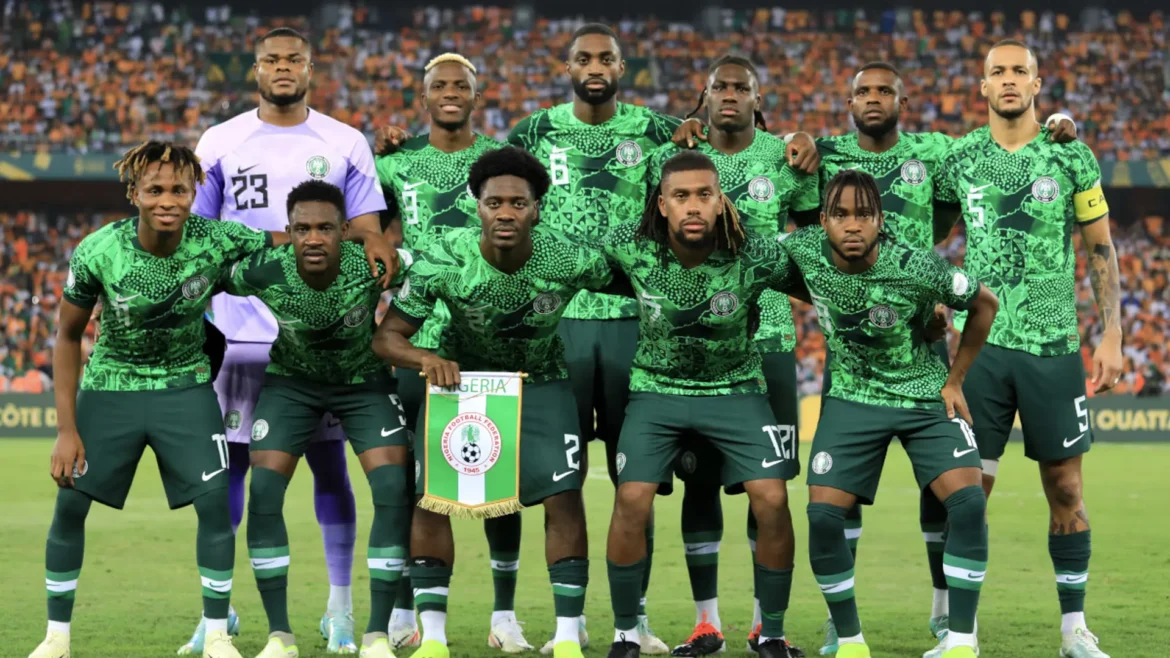The Nigerian football team has decided to boycott their upcoming 2025 Africa Cup of Nations (AFCON) qualifier match against Libya, following a series of logistical and safety concerns that left the Super Eagles stranded in Libya. The Nigerian Football Federation (NFF) confirmed the decision after the team endured a night at an airport in Al Abraq, about 230km away from their intended destination, Benghazi, where the match was scheduled to take place.
Stranded at the Airport
The Nigerian football team was originally set to land in Benghazi on Sunday, but their flight was unexpectedly diverted to Al Abraq without explanation. Upon arrival, the team was “completely abandoned” and locked inside the airport building with no assistance from the Libyan authorities, according to NFF officials. Captain William Troost-Ekong, who has been vocal about the team’s treatment, announced that the players would boycott the AFCON 2025 qualifier, citing both safety concerns and the poor conditions they were subjected to.
“We will not play this game,” Troost-Ekong declared, adding that the team had experienced logistical challenges before but described this as “disgraceful behavior.” Nigerian striker Victor Boniface also took to social media to express the team’s frustration, revealing that they were left without food, wi-fi, or proper sleeping arrangements. Photos shared by the team on social media showed players sprawled out on airport seating, waiting for a resolution.

Libyan and Nigerian Responses
In response to the accusations, the Libyan Football Federation (LFF) denied any intentional wrongdoing, stating that the flight diversion was due to routine air traffic protocols and logistical challenges. The LFF expressed regret over the situation but insisted that there was no foul play involved. “We have the utmost respect for our Nigerian counterparts,” the LFF said in a statement, rejecting any claims of deliberate sabotage.
Meanwhile, Nigeria’s Minister of Sports Development, Senator John Owan Enoh, emphasized that the team’s safe return was the top priority. Enoh instructed the NFF to file a formal complaint with the Confederation of African Football (CAF) regarding the team’s treatment in Libya. He also held discussions with CAF President Patrice Motsepe, who expressed a desire for the match to proceed as scheduled. However, Enoh maintained that the team could not go ahead with the game, citing both physical and psychological trauma.
Safety Concerns and the Boycott Decision
The security situation in Libya further exacerbated the team’s concerns. Libya is currently divided between two rival administrations—one based in Benghazi in the east, and another in Tripoli in the west—creating a volatile political climate. Troost-Ekong made it clear that the players did not feel safe traveling by road to Benghazi, a journey that would take over three hours. He expressed concerns about potential risks, stating, “We will not accept to travel anywhere by road here even with security. It’s not safe.”
The NFF also revealed that the Nigerian embassy in Tripoli was unable to intervene due to the political instability, leaving the team with limited options. Troost-Ekong underscored the players’ decision not to continue, emphasizing that their dignity and safety were paramount.
Broader Implications
The decision for the Nigerian football team to boycott the AFCON 2025 qualifier has drawn attention from both African and international football communities. CAF has referred the matter to its disciplinary board for further investigation. A CAF statement acknowledged the “disturbing conditions” that the Nigerian team faced and promised to take action if any violations of CAF statutes and regulations were found.
The boycott also follows recent tensions between the two football federations. Libya had previously raised complaints about their own treatment during a visit to Nigeria for the reverse fixture in Uyo, where they claimed they were rerouted and left stranded without transport. Those accusations were denied by the NFF, and Nigeria went on to win the match 1-0.
Future of the Qualifier
With Nigeria topping Group D and Libya at the bottom with just one point, the impact of this boycott on the AFCON 2025 qualifiers remains unclear. The match, which was initially scheduled for Tuesday, is now in jeopardy, with CAF expected to make a decision on the outcome based on its investigation. Senator Enoh made it clear that Nigeria’s participation would not continue under the current circumstances, stating, “The team insists they’re unable to go ahead with the match, not just because of the trauma and consequent psychological torture but also because of fear for their safety.”
As the situation unfolds, the decision for the Nigerian football team to boycott the AFCON 2025 qualifier underscores the ongoing challenges that African teams face when playing in volatile regions. While CAF works to resolve the issue, it remains to be seen how this will impact Nigeria’s path in the AFCON qualifiers and whether any sanctions will be imposed as a result of the boycott.
Stay connected to know more on arcnews.online for global news like Nigerian Football Team To Boycott AFCON 2025 Qualifier. For videos updates visit our YouTube. Do subscribe to Arcnews to get latest updates directly in your mail box.
Have A Great Day.


